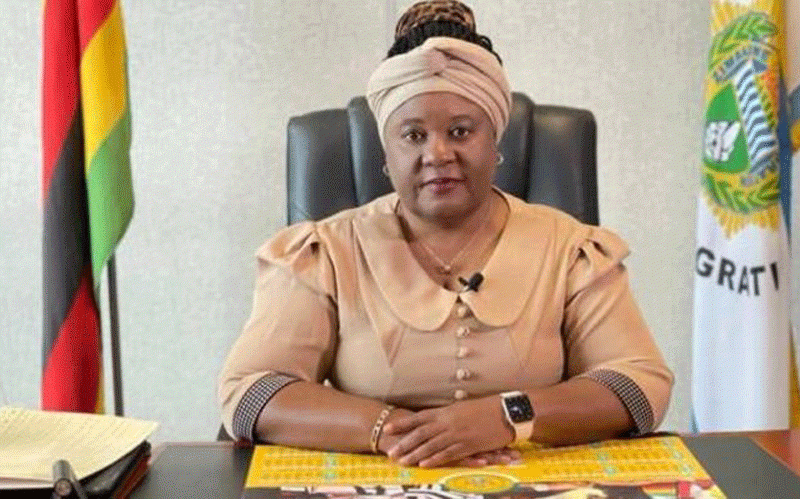HUNDREDS of Chinese nationals have been deported since January, as authorities cracked down on foreigners dribbling past immigration, claiming they are working for Chinese multinationals executing multi-billion dollar projects in the country, the Zimbabwe Independent can report.

HUNDREDS of Chinese nationals have been deported since January, as authorities cracked down on foreigners dribbling past immigration, claiming they are working for Chinese multinationals executing multi-billion dollar projects in the country, the Zimbabwe Independent can report.
Chinese companies sit at the heart of Zimbabwe's bold infrastructure revamp programme, which is meant to rebuild a country that has been shattered by maladministration for decades.
Major projects undertaken or funded by Chinese banks include the US$154 million Robert Gabriel Mugabe (RGM) International Airport expansion.
Chinese firms also undertook the US$150 million Victoria Falls International Airport facelift, which was completed in 2016, along with the US$553 million Kariba power station project completed in 2018.
But the biggest was the US$1,5 billion Hwange power station Unit 7&8 refurbishment, which added 600 megawatts to the national grid on completion in 2023.
Respect Gono, chief director at the department of immigration, said this week investigations had exposed how the mega projects had been used by Chinese migrants to circumvent authorities and settle in Zimbabwe illegally.
Officials said the Chinese were vanishing as soon as they are cleared by immigration.
Gono told the Independent that her department had tightened the screws at major ports of entry since the operation began, and many foreigners were being turned away on arrival.
Information from the department of immigration showed that nationals from Malawi and another Asian country had also been netted in the operation.
One official said the nationals from the Asian country were claiming to be bringing herbal medicine to Zimbabwean traditional healers, but then disappeared.
Nationals from that country were also suspected to be drug trafficking.
Sources familiar with the developments said in the past month alone up to 500 Chinese, Malawians and other nationals have been deported under the crackdown.
Gono said while Zimbabwe was ‘Open for Business’, it was important for foreigners to respect its laws.
“Our main mandate is to protect the security of Zimbabwe,” the immigration chief said.
“We turn some of the illegal immigrants away right at the airport. Major projects like Hwange 7&8 and other big projects saw a huge influx of Chinese and other people to Zimbabwe purporting to be part of the projects.
“Zimbabwe is ‘Open for Business, as you know our mantra. But it does not mean we allow illegal migration. We promote safe and regular migration.
“What we then do is check on our system if you are really here on a work basis. If you are not, we ask you to leave,” she added.
Gono said immigrants from Malawi were not being deported, but repatriated.
However, she noted that the illegal migrants were arriving in Zimbabwe claiming they were going to work on farms.
“We let their embassy identify them. After that we hire buses to take them back,” Gono said.
“This is just sending them back through proper channels so that we do not ruin relations. We do not deport Malawians.
“We repatriate them because they are part of the Southern African Development Community. What happens is that sometimes they hide their passports after getting into Zimbabwe. We conduct a search and find that they do have passports,” she added.
Mwayiwawo Polepole, Malawian ambassador to Zimbabwe, said: “Indeed, there are some Malawians who were found not to have had valid travel documents.
“Considering that cases of that nature were increasing and filling up space in prisons, the Government of Zimbabwe through the immigration department honoured the United Nations convention that the host country of those arrested should be sent back to their countries.
“As neighbours and countries enjoying a long history of bilateral and diplomatic relations, two busses were dispatched to Malawi in January.
“Again, in February, another bus-load was dispatched to Malawi. In some instances, when immigration informs the embassy of such cases, the embassy engages in a process of self-repatriation.
“These processes are normal. The embassy is grateful to the Government of Zimbabwe for such a gesture,” the ambassador said.
The Chinese embassy did not respond to the Independent’s questions.
China and Zimbabwe elevated their diplomatic ties to ‘strategic’ a few years ago, after the southern African country announced the ‘Look East Policy’ in 2005.
This was after relations with western markets turned sour following the agrarian reforms in 2000.
Chinese firms have clinched massive deals in Zimbabwe since then, and some credit the world’s second biggest economy for helping Zimbabwe pull through massive economic upheavals since western power imposed sanctions on the country from 2000.
In the first nine months of 2023, trade between China and Zimbabwe climbed by 39,4% to US$2,43 billion.
Zimbabwe's exports to China during the comparative period stood at US$1,36 billion, while imports amounted to US$1,07 billion.
This month state security agencies also deported four American nationals whom they said were in the country illegally.

© Voice Of Zimbabwe Privacy Policy Contact us